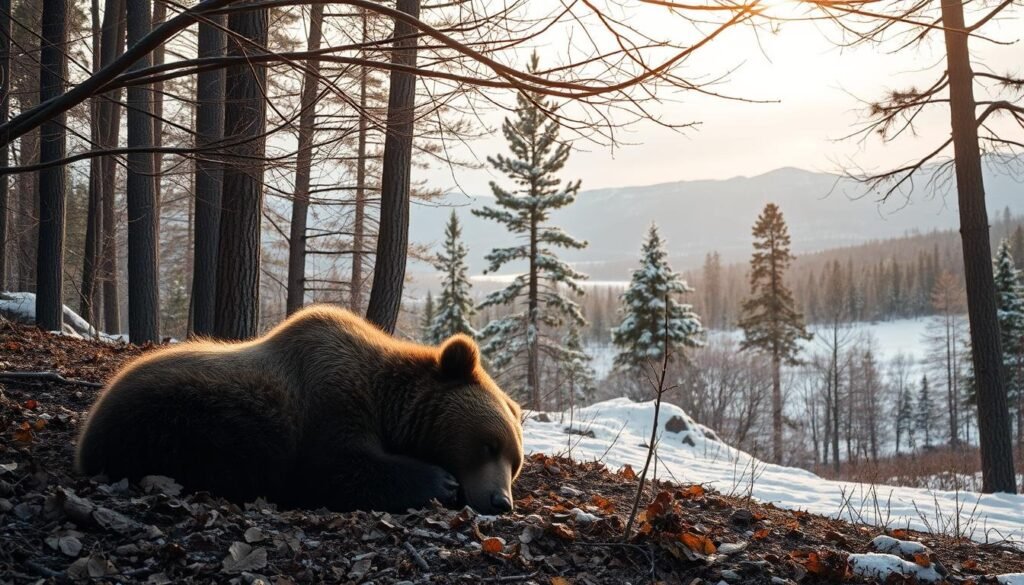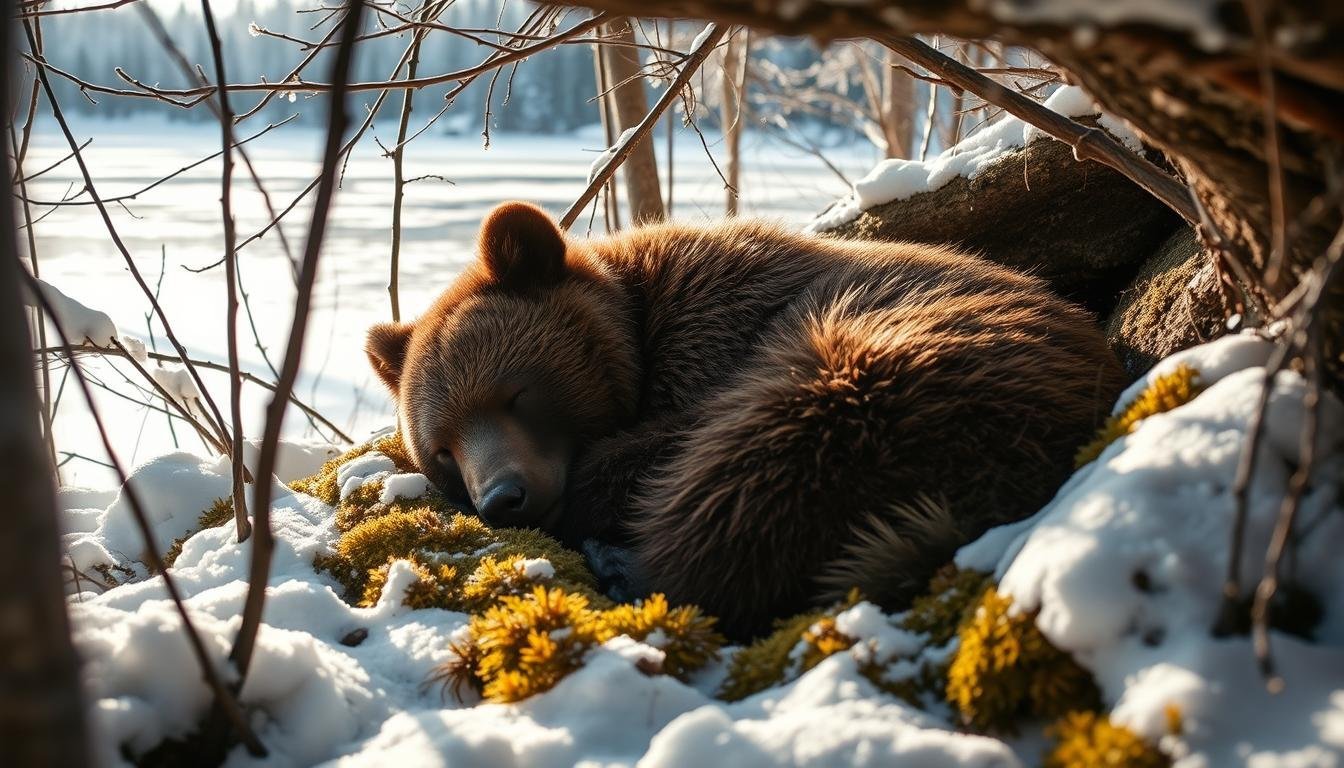Why Do Bears Hibernate in Winter? Exploring the world of bears, you might wonder about their winter sleep. Hibernation is a special state that helps bears save energy when food is hard to find.
In this article, we’ll look into the reasons behind bear hibernation. You’ll learn about the amazing physiology that makes it work. We’ll also see how bears get ready for hibernation and the different ways different bears do it.
Learning about bear hibernation helps us understand how these animals survive the cold winter. It’s a key part of their survival.
Contents
- 1 Understanding Bear Hibernation Basics
- 2 Why Do Bears Hibernate During Winter Months?
- 3 The Fascinating Physiology of Hibernating Bears
- 4 Hibernation Patterns Across Different Bear Species
- 5 Conclusion: Why Do Bears Hibernate in Winter?
- 6 FAQ
- 6.1 What is hibernation, and how does it help bears survive the winter?
- 6.2 Why do bears hibernate during the winter months?
- 6.3 How do bears prepare for hibernation?
- 6.4 Do all bear species hibernate in the same way?
- 6.5 How do hibernating bears maintain muscle mass and bone density?
- 6.6 What happens to a bear’s body during hibernation?
- 6.7 How does hibernation affect bear reproduction and development?
Understanding Bear Hibernation Basics
Hibernation in bears is more than just sleep. It’s a special state with big changes in their body. These changes help them save energy when food is hard to find in winter.
A bear’s heart rate slows down a lot during hibernation. It can go from 40-50 beats per minute to just 8-10. This helps them use less energy. They can go without eating, drinking, or making waste for a long time.
Bears also get colder during hibernation. This helps them use even less energy. Their heart rate and body temperature going down shows how bears are great at surviving winter.
Learning about hibernation basics helps us understand bears’ amazing winter adaptation. By studying these changes, scientists can learn how bears save energy and live without food or water for months.
Why Do Bears Hibernate During Winter Months?
Have you ever wondered why bears hibernate in the cold winter? The main reason is because food is hard to find. Plants and animals that bears eat are scarce in winter.
Hibernation helps bears avoid searching for food when it’s not available. This is key for their survival. It also impacts their reproduction and growth, making it essential for their life cycle.

- Food scarcity during winter months
- Conservation of energy
- Protection from harsh weather conditions
Hibernation is more than just sleeping. It’s a special state that lets bears survive and even grow in tough times.
The Fascinating Physiology of Hibernating Bears
Hibernating bears go through many changes to survive. Their heart rate drops from 40-50 beats per minute to just 8-10. This helps save energy since they’re not hunting or moving much.
Their body temperature also drops, sometimes as low as 88°F (31°C). This is much cooler than their usual 98°F (36.7°C). This lower temperature helps them use less energy.
Even though they’re not moving, bears keep their muscles and bones strong. This is amazing because you’d think they’d lose muscle and bone from not moving. But bears have a special way to keep their muscles by recycling waste.
Physiological Changes During Hibernation
| Physiological Parameter | Normal State | Hibernation State |
|---|---|---|
| Heart Rate (beats per minute) | 40-50 | 8-10 |
| Body Temperature (°F) | 98 | 88 |
| Metabolic Rate | Normal | Reduced |
These changes are not just interesting; they’re also key to the bear’s survival in winter. By studying these changes, we learn how bears can live well in tough conditions.
The ability of bears to hibernate is a testament to their remarkable physiological flexibility, allowing them to survive and even thrive in conditions that would be challenging for many other animals.
Hibernation Patterns Across Different Bear Species
Different bear species have unique hibernation patterns. This is especially true when comparing bears in temperate regions to those in arctic environments.
Arctic bears, like polar bears, have special hibernation habits. They don’t truly hibernate like brown bears or black bears. Their body temperature doesn’t drop as much.
Adaptation to Arctic Environments
Polar bears have special ways to survive in the cold. They slow down their metabolism to save energy. This is key because food is hard to find in winter.
| Bear Species | Hibernation Pattern | Adaptation to Environment |
|---|---|---|
| Polar Bears | Reduced metabolic rate, not true hibernation | Thick fur and blubber for insulation |
| Brown Bears | True hibernation with lowered body temperature | Hibernation dens insulated with snow and vegetation |
| Black Bears | True hibernation | Adaptable to various environments, from forests to mountains |
The table shows how different bears hibernate. Polar bears have a special way to survive in the arctic. But other bears, like brown and black bears, have their own ways to make it through winter.
Learning about these adaptations helps us understand bears better. It also shows why we need to protect their habitats. As we learn more about bear hibernation, we see how important their environments are to them.
Conclusion: Why Do Bears Hibernate in Winter?
Bear hibernation is a remarkable way for bears to survive and thrive in different places. By learning about their winter sleep and physical changes, we can better appreciate these amazing animals.
Hibernation is more than just sleeping. It’s a special state that helps bears save energy and get through tough winters. Thinking about how bears adapt to their environments through hibernation is truly fascinating.
See Also: Discover Why Raccoons Wash Their Food Before Eating
FAQ
What is hibernation, and how does it help bears survive the winter?
Hibernation is a special state where bears change a lot to save energy. Their heart rate slows down, and their body gets colder. This helps them not need to eat, drink, or go to the bathroom during winter.
Why do bears hibernate during the winter months?
Bears hibernate because there’s no food in winter. It lets them stay warm and safe without looking for food.
How do bears prepare for hibernation?
Bears eat a lot before hibernation to build up fat. This fat is their energy for the long sleep.
Do all bear species hibernate in the same way?
No, each bear species hibernates differently. For example, polar bears adjust to the cold Arctic.
How do hibernating bears maintain muscle mass and bone density?
Bears keep their muscles and bones strong even when they’re not moving. It’s because of special changes in their body.
What happens to a bear’s body during hibernation?
A bear’s heart beats slower, and their body gets colder. These changes help them save energy for winter.
How does hibernation affect bear reproduction and development?
Hibernation is important for bears to have babies and grow. It’s a safe time for mothers to care for their cubs.

Zyair Larson, based in Denver, Colorado, has over 12 years of experience studying animal behavior. He has worked with the World Wildlife Fund (WWF) and National Geographic, researching wildlife and sharing insights on animal habits globally.

